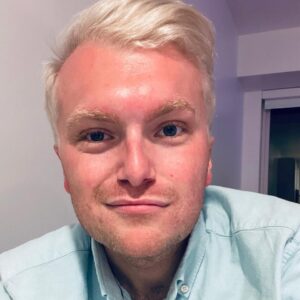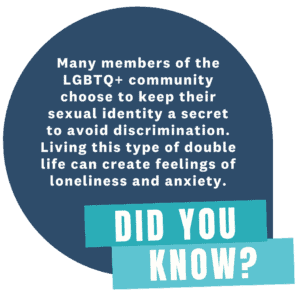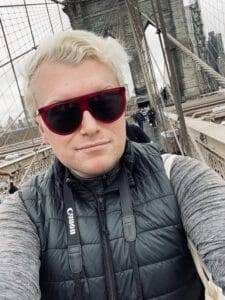Q: What would you like people to know about you?

From a young age, I knew I was different. I was very critical of my body and would do whatever was necessary to present myself in a way that I thought would be acceptable, including starving myself and eating limited amounts of food. I knew I was gay in junior high school. As a young boy through my early teenage years, I was bullied for being effeminate. I was a “pretty boy” so they would say.
As I got older, the idea that I was gay began to haunt me more and more. I was very ashamed of it and at no point would I ever tell anyone the truth so I thought. I felt like I had to keep this secret to myself for the rest of my life. I became very depressed and hated the way I felt. I just wanted to escape. Thankfully (yes, thankfully) I found alcohol and man did I feel a sense of relief the first time I drank it. Alcohol helped me survive. I felt like I could be myself when I drank alcohol. I was able to feel comfortable in my own skin for the first time in my life.

Q: What your life was like before recovery?
Cody: My life before recovery was chaotic, to say the least. When I started using chemicals, I lost sight of what mattered to me; my family, friends, school, goals, and most importantly my health. Life without recovery can be dark, lonely, and depressing. I did whatever I could to make it through the day. I didn’t really think about the future. I had no intention of seeking a better way of life for a long time. It took spiritual bankruptcy and a moment of clarity for me to realize I deserved so much more in this life.
Recovery is an intimate process of self-reflection and redirection that allows me to achieve optimal health and wellness.Cody T.
Q: What are your plans for the future now that you are in recovery?

Q: What do you want folks to know about the importance of addiction and recovery support services on your campus?
Cody: Recovery support services are vital on college campuses. Many students are unable to proceed with school or fail their classes because they are unable to receive the support they need to flourish and recover while in college. We must be more intentional about reaching out to students and ensuring they know what recovery support services exist if any. It is imperative that students in recovery are connected with struggling students. Being able to speak with someone you can relate to, at least on an academic level, can make all the difference. More people need to be talking about recovery on campus. Whether you are struggling to stop using chemicals, are in recovery from a substance use disorder, or know a loved one impacted by this disease, it affects so many of us whether we realize it or not.
Q: Describe what addiction and recovery support services look like on your campus and how did it get there?

Q: What advice would you give to someone who is trying to make their recovery space more inclusive of the LGBTQ+ community?
Cody: Be open-minded and open-hearted. Seek to understand LGBTQ+ people and their experiences. Seek to understand those who don’t understand or support the lifestyles of LGBTQ+ people. Your willingness to engage with ignorance and those you disagree with gives you a great opportunity to educate others and support your community. People can change. At the end of the day, love trumps hate!
Q: Why was joining the Leadership Academy important to you and how has it impacted the collegiate recovery community on your campus?
Cody: Prior to this academic year, there wasn’t an established collegiate recovery community on my campus nor were there recovery support meetings taking place. I wanted to work with other students to create a presence and space for recovery on campus and we did just that!
